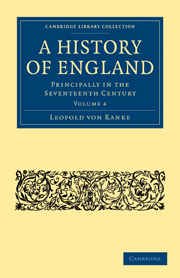Book contents
- Frontmatter
- Contents
- BOOK XVI THE LATER YEARS OF CHARLES II, 1675—1685 WHIGS AND TORIES
- BOOK XVII REIGN OF JAMES II, FEBRUARY 1685 TO SEPTEMBER 1688
- BOOK XVIII THE FALL OF JAMES II IN ITS CONNEXION WITH THE EUROPEAN CONFLICTS WHICH MARKED THE CLOSE OF 1688
- BOOK XIX COMPLETION OF THE REVOLUTION IN THE THREE KINGDOMS, 1688—1691
- INTRODUCTION
- CHAP. I William of Orange in London. Summoning of a Convention
- CHAP. II First sittings of the Convention. Debates on the vacancy of the Throne
- CHAP. III Elevation of the Prince of Orange to the English Throne. Constitutional limitations of the power of the Crown
- CHAP. IV James II in Ireland supported by help from France
- CHAP. V Dundee in the Scottish Highlands
- CHAP. VI Military events in Ireland in the year 1689
- CHAP. VII Dissensions in the Convention Parliament
- CHAP. VIII Dissolution of the Convention Parliament. First sittings of the Parliament of 1690
- CHAP. IX The Court at Dublin. Rivalry of the French and English Navies
CHAP. VI - Military events in Ireland in the year 1689
Published online by Cambridge University Press: 07 September 2011
- Frontmatter
- Contents
- BOOK XVI THE LATER YEARS OF CHARLES II, 1675—1685 WHIGS AND TORIES
- BOOK XVII REIGN OF JAMES II, FEBRUARY 1685 TO SEPTEMBER 1688
- BOOK XVIII THE FALL OF JAMES II IN ITS CONNEXION WITH THE EUROPEAN CONFLICTS WHICH MARKED THE CLOSE OF 1688
- BOOK XIX COMPLETION OF THE REVOLUTION IN THE THREE KINGDOMS, 1688—1691
- INTRODUCTION
- CHAP. I William of Orange in London. Summoning of a Convention
- CHAP. II First sittings of the Convention. Debates on the vacancy of the Throne
- CHAP. III Elevation of the Prince of Orange to the English Throne. Constitutional limitations of the power of the Crown
- CHAP. IV James II in Ireland supported by help from France
- CHAP. V Dundee in the Scottish Highlands
- CHAP. VI Military events in Ireland in the year 1689
- CHAP. VII Dissensions in the Convention Parliament
- CHAP. VIII Dissolution of the Convention Parliament. First sittings of the Parliament of 1690
- CHAP. IX The Court at Dublin. Rivalry of the French and English Navies
Summary
The contest in Ireland had in itself far greater importance than that in Scotland. In both countries the Keltic population was on the side of the hereditary King, but in Ireland it formed a large majority, in Scotland a small minority of the population. While the Jacobites in Scotland, far from contesting the preponderance of the Teutonic population, or even of the Protestant religion, only opposed a revolution which had taken place suddenly, and strove to maintain the constitution which had been legally established during the last twenty years and more, the object aimed at in Ireland was the complete transformation of the mode of government which had previously existed, and either the destruction, or at least without doubt the subjugation of the Teutonic element. The members of the native party in Ireland persisted in their attachment to the Catholic religion, which procured them a support in Roman Catholic Europe; that attachment was not perhaps necessary in itself, but they had been accustomed to it for a century and a half, and it had become indissoluble. The consequence of this was, that the Teutonic element, so far as it was also kept together by Protestantism, united for resistance without regard to the ecclesiastical differences which prevailed in its bosom. The Protestants of Scottish and English descent formed an association against the Popish and illegal counsellors of King James, and attached themselves expressly to the government of England in the form which it was assuming at the same time under the influence of continental relations.
- Type
- Chapter
- Information
- A History of EnglandPrincipally in the Seventeenth Century, pp. 555 - 564Publisher: Cambridge University PressPrint publication year: 2010First published in: 1875



